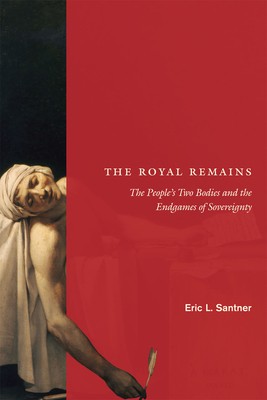
- We will send in 10–14 business days.
- Author: Eric L Santner
- Publisher: University of Chicago Press
- Pages: 284
- ISBN-10: 0226735362
- ISBN-13: 9780226735368
- Format: 15.2 x 22.6 x 1.8 cm, softcover
- Language: English
- SAVE -10% with code: EXTRA
Reviews
Description
"The king is dead. Long live the king!" In early modern Europe, the king's body was literally sovereign--and the right to rule was immediately transferrable to the next monarch in line upon the king's death. In The Royal Remains, Eric L. Santner argues that the "carnal" dimension of the structures and dynamics of sovereignty hasn't disappeared from politics. Instead, it migrated to a new location--the life of the people--where something royal continues to linger in the way we obsessively track and measure the vicissitudes of our flesh.
Santner demonstrates the ways in which democratic societies have continued many of the rituals and practices associated with kingship in displaced, distorted, and usually, unrecognizable forms. He proposes that those strange mental activities Freud first lumped under the category of the unconscious--which often manifest themselves in peculiar physical ways--are really the uncanny second life of these "royal remains," now animated in the body politic of modern neurotic subjects. Pairing Freud with Kafka, Carl Schmitt with Hugo von Hofmannsthal, and Ernst Kantorowicz with Rainer Maria Rilke, Santner generates brilliant readings of multiple texts and traditions of thought en route to reconsidering the sovereign imaginary. Ultimately, The Royal Remains locates much of modernity--from biopolitical controversies to modernist literary experiments--in this transition from subjecthood to secular citizenship. This major new work will make a bold and original contribution to discussions of politics, psychoanalysis, and modern art and literature.EXTRA 10 % discount with code: EXTRA
The promotion ends in 17d.02:59:16
The discount code is valid when purchasing from 10 €. Discounts do not stack.
- Author: Eric L Santner
- Publisher: University of Chicago Press
- Pages: 284
- ISBN-10: 0226735362
- ISBN-13: 9780226735368
- Format: 15.2 x 22.6 x 1.8 cm, softcover
- Language: English English
"The king is dead. Long live the king!" In early modern Europe, the king's body was literally sovereign--and the right to rule was immediately transferrable to the next monarch in line upon the king's death. In The Royal Remains, Eric L. Santner argues that the "carnal" dimension of the structures and dynamics of sovereignty hasn't disappeared from politics. Instead, it migrated to a new location--the life of the people--where something royal continues to linger in the way we obsessively track and measure the vicissitudes of our flesh.
Santner demonstrates the ways in which democratic societies have continued many of the rituals and practices associated with kingship in displaced, distorted, and usually, unrecognizable forms. He proposes that those strange mental activities Freud first lumped under the category of the unconscious--which often manifest themselves in peculiar physical ways--are really the uncanny second life of these "royal remains," now animated in the body politic of modern neurotic subjects. Pairing Freud with Kafka, Carl Schmitt with Hugo von Hofmannsthal, and Ernst Kantorowicz with Rainer Maria Rilke, Santner generates brilliant readings of multiple texts and traditions of thought en route to reconsidering the sovereign imaginary. Ultimately, The Royal Remains locates much of modernity--from biopolitical controversies to modernist literary experiments--in this transition from subjecthood to secular citizenship. This major new work will make a bold and original contribution to discussions of politics, psychoanalysis, and modern art and literature.

Reviews